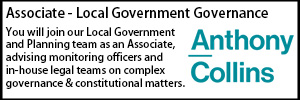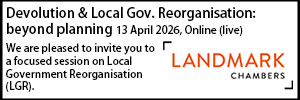Oflog remit should be extended to local government audit, CIPFA CEO suggests
- Details
The chief executive of CIPFA, Rob Whiteman, has said Government plans for Oflog will leave the new body with a "limited scope" and has suggested the regulator would be better placed as system leader for local government audit.
Speaking to the Committee for Levelling Up, Housing and Communities on Monday (14 April) alongside Ed Hammond of the Centre for Governance and Scrutiny and Professor Laurence Fox, a government accounting academic, Whiteman questioned how effective Oflog will be under current plans.
The Government launched Oflog in July 2023, with the goals of providing data analysis that would inform the public, warning local authorities of financial risks and supporting them in mitigating those risks.
Whiteman told MPs: "In summary, we all think data is a good thing, and personally, I think Oflog coordinating data is a good thing. However, it is a fairly limited scope."
He added: "Because it has been given such a limited scope – in order that it doesn't scare the horses – in a way it's hard to see it being very effective."
Whiteman also questioned whether Oflog could achieve the goal of detecting serious financial issues in councils early.
He said: "If one thinks about the 114 notices that we've had, would Oflog have led to them being avoided? Possibly Northamptonshire – a sort of straightforward not making enough savings, spending too much money, running into reserves.
"I'm not sure that Oflog would have noticed the misapplication of minimum revenue provision at Slough - or the misallocation of inter-authority lending at Thurrock.
"It may have noticed the monumental scale of borrowing at Woking, but the Treasury had probably noticed that too."
He added: "The sharing of intelligence with the system leader is a really important thing. Straight data probably may have saved one of these 114s in Northamptonshire, but the others were a lot more, weren't they?"
Commenting on the Government's plans, Dr Ferry said: "They talk about a lot of things that they won't do.
"They won't lobby, they won't arbitrate, they won't have routine inspections, they won't intervene like a regulator, and they'll not make any policy on external audit.
"So if you start looking at everything that they won't do, what's left? A bit of performance data collection and then you could say that's really doing what people already do and maybe not in as much detail."
Ferry suggested that if Oflog became the system leader in local government audit and was properly resourced it could make "quite a large improvement" in helping identify financial distress in councils.
The Government plans to make the Financial Reporting Council (FRC) the system leader for local government audit, reporting and governance through the creation of an new organisation called the Auditing, Reporting and Governance Authority (ARGA).
However, when asked whether it made more sense for Oflog to take ARGA's future role, Whiteman said: "Yes, I think it would, because ARGA is a little bit stuck itself, isn't it? It did not get into the King's Speech, so making the FRC the system leader through the creation of ARGA has got a little bit stuck, but I assume that DLUHC will give some mandate to the FRC in the absence of ARGA being in the King's Speech."
He added: "I am sure that the FRC will try its best to be the system leader, but if one thinks of Scotland, for example, where some of the problems that have occurred in English local public audit have not arisen, the Auditor General of Scotland, through the Accounts Commission, has a direct role in the procurement and quality of local public audit, like the Audit Commission used to in England.
"I think that works very well, so my view is that if the single most important thing that the Government must get right is local public audit, having local public audit sit with the regulator that they are creating is probably more important than the other things that Oflog is presently being given to do."
Ed Hammond added that "Government badly needs a centre of expertise and excellence that could be Oflog to give it a level of insight into councils".
He said: "Now, that is a stretch on what government has set out Oflog's role will be, but I think in practice that is the only obvious space it can occupy where it would contribute something of value."
Adam Carey
Head of Legal Services / Deputy Monitoring Officer
Governance Officer/Company Secretary
Locums
Poll

















